
Wilberforce University is a private historically black university in Wilberforce, Ohio. Affiliated with the African Methodist Episcopal Church (AME), it was the first college to be owned and operated by African Americans. It participates in the United Negro College Fund.
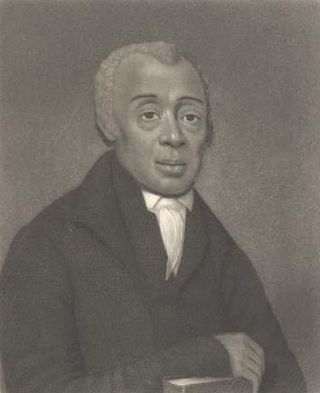
Richard Allen was a minister, educator, writer, and one of the United States' most active and influential black leaders. In 1794, he founded the African Methodist Episcopal Church (AME), the first independent Black denomination in the United States. He opened his first AME church in 1794 in Philadelphia.
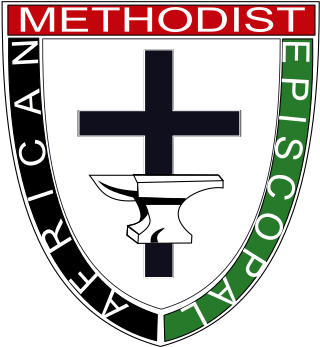
The African Methodist Episcopal Church, usually called the AME Church or AME, is a Methodist Black church. It adheres to Wesleyan-Arminian theology and has a connexional polity. The African Methodist Episcopal Church is the first independent Protestant denomination to be founded by black people; though it welcomes and has members of all ethnicities.

The Mother Bethel African Methodist Episcopal Church is an historic church and congregation which is located at 419 South 6th Street in Center City Philadelphia, Pennsylvania, USA. The congregation, founded in 1794, is the oldest African Methodist Episcopal congregation in the nation.

The African Methodist Episcopal Zion Church, or the AME Zion Church (AMEZ) is a historically African-American Christian denomination based in the United States. It was officially formed in 1821 in New York City, but operated for a number of years before then. The African Methodist Episcopal Zion Church adheres to Wesleyan-Arminian theology.
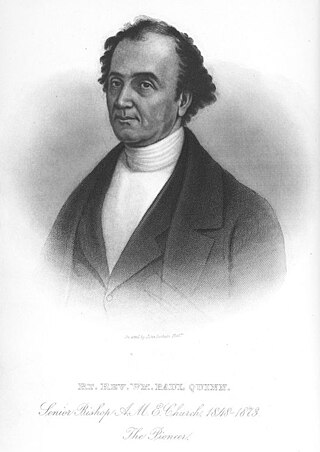
William Paul Quinn was born in India and immigrated to the United States, where he became the fourth bishop of the African Methodist Episcopal Church, the first independent black denomination in the United States when founded in 1816 in Philadelphia, Pennsylvania.
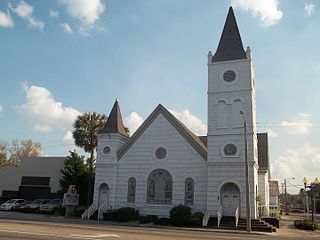
The black church is the faith and body of Christian denominations and congregations in the United States that minister predominantly to, and are led by, African Americans, as well as these churches collective traditions and members. The term "black church" may also refer to individual congregations in traditionally white denominations.

Daniel Alexander Payne was an American bishop, educator, college administrator and author. A major shaper of the African Methodist Episcopal Church (AME), Payne stressed education and preparation of ministers and introduced more order in the church, becoming its sixth bishop and serving for more than four decades (1852–1893) as well as becoming one of the founders of Wilberforce University in Ohio in 1856. In 1863, the AME Church bought the college and chose Payne to lead it; he became the first African-American president of a college in the United States and served in that position until 1877.
Black Methodism in the United States is the Methodist tradition within the Black Church, largely consisting of congregations in the African Methodist Episcopal (AME), African Methodist Episcopal Zion, Christian Methodist Episcopal denominations, as well as those African American congregations in other Methodist denominations, such as the Free Methodist Church.
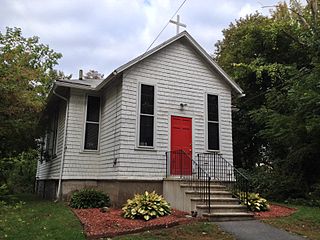
The Goodwin Memorial African Methodist Episcopal Zion Church is a historic church on Woodside Avenue in Amherst, Massachusetts. It is a member of the National African Methodist Episcopal Zion Church denomination, which is historically African American and began in the United States. The history of the Goodwin Memorial African Methodist Episcopal (A.M.E.) Zion Church in Amherst, Massachusetts is an important part of the broader context of African American history. The A.M.E. Zion denomination was created in conjunction with growing African American identities. Locally, the Goodwin Memorial A.M.E. Zion Church is one of the few physical structures that speaks to the rich African American history and heritage in the town of Amherst and surrounding areas.
Saint Philip AME Church in Atlanta, Georgia is the largest congregation in the Sixth Episcopal district of the African Methodist Episcopal Church with over 5,000 members.

St. Paul's African Methodist Episcopal Church is a historic church in Urbana, Ohio, United States. Built in the Greek Revival style in 1876, it is home to a congregation that was founded in the mid-1820s.
The Reid Temple A.M.E. Church is an African Methodist Episcopal megachurch located in Glenn Dale, Maryland, USA to the northeast of Washington, DC. In 2008, Outreach Magazine reported that attendance was 7,500, making it the 88th largest church in the US at that time. Reid Temple is located in Glenn Dale, Maryland with a membership of well over 6,000 persons.

Jordan Winston Early was an American Methodist preacher, he is considered to have been one of the pioneers of African American Methodism spread in the West and South of the United States. In 1868, he married Sarah Jane Woodson Early, and the couple were prominent in spreading Methodism and black nationalism, and his wife taught wherever he preached.
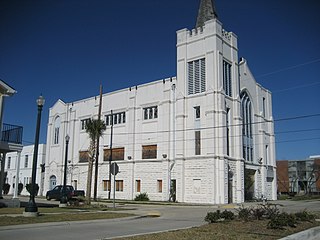
The Union Bethel A.M.E. Church in New Orleans, Louisiana, at 2321 Thalia St. at the corner of Liberty St., is a historic African Methodist Episcopal church.

The Emanuel African Methodist Episcopal Church, often referred to as Mother Emanuel, is a church in Charleston, South Carolina. Founded in 1817, Emanuel AME is the oldest African Methodist Episcopal church in the Southern United States. This, the first independent black denomination in the United States, was founded in 1816 in Philadelphia, Pennsylvania.
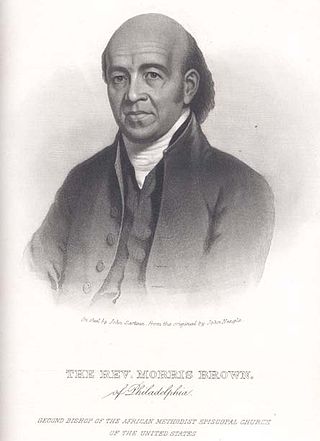
Morris Brown was one of the founders of the African Methodist Episcopal Church, and its second presiding bishop. He founded Emanuel AME Church in his native Charleston, South Carolina. It was implicated in the slave uprising planned by Denmark Vesey, also of this church, and after that was suppressed, Brown was imprisoned for nearly a year. He was never convicted of a crime.
Jeffery Tribble is an ordained elder in the African Methodist Episcopal Zion Church and a professor of ministry with research interests in Practical Theology, Congregational Studies and Leadership, Ethnography, Evangelism and Church Planting, Black Church Studies, and Urban Church Ministry. Academics and professionals in these fields consider him a renowned thought leader. Tribble's experience in pastoral ministry allows for his work to bridge the gap between academic research and practical church leadership.

Payne Theological Seminary is an African Methodist Episcopal seminary in Wilberforce, Ohio. It is the oldest free-standing African-American seminary in the United States. Incorporated in 1894 by the African Methodist Episcopal Church, it was named after Daniel Alexander Payne, the founder of Wilberforce University. Payne was Senior Bishop of the AME Church at the time of the Seminary’s founding and served as its first dean. He was the first African-American college president.

Bethel African Methodist Episcopal Church is a historic African American church founded in 1852 and is located in the Fillmore District in San Francisco, California. It was one of the earliest African American churches in the west. The church occupied several spaces in San Francisco over the course of its history, as well as gone by various names.



















